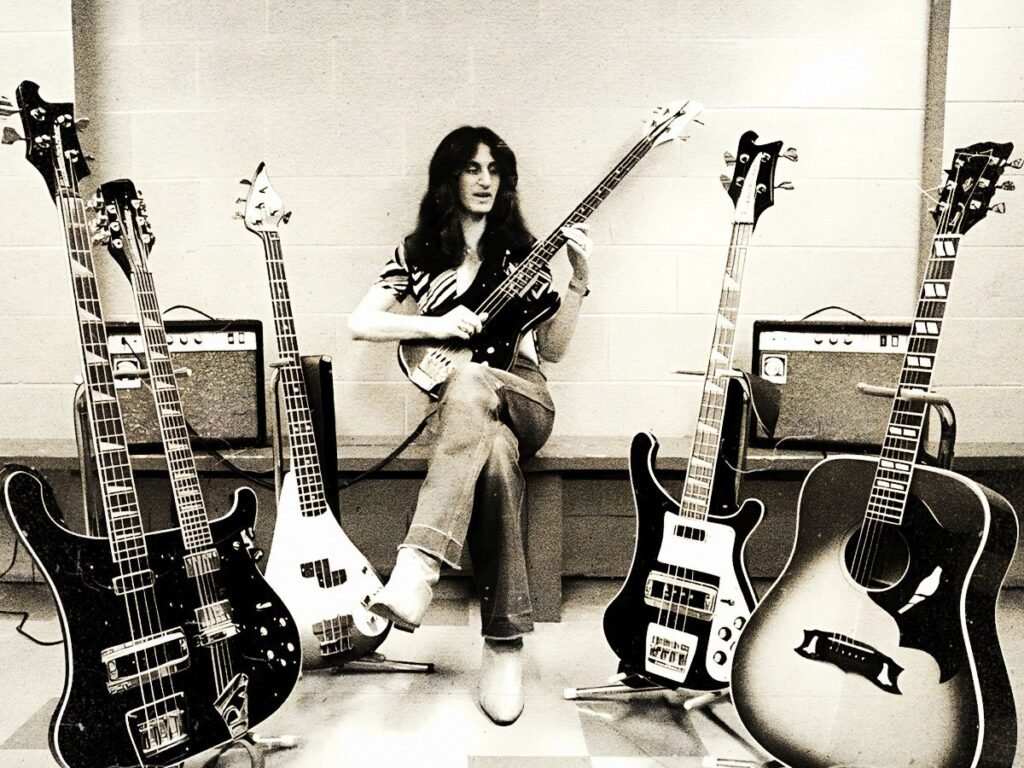
(Credits: Far Out / TimothyJ)
Former Rush frontman and bassist Geddy Lee is one of the most mythical musicians of all time. From his iconic falsetto to his locomoting bass flourishes, right down to his generally cordial nature, there are many reasons to love him. He is a unique phenomenon and was a vital cog in rock’s premier trio, and it is safe to say that without him, Rush would not have been the same group that we love today.
It is only fitting for a group so distinctive that each of its members brought something different to the table. The band’s late drummer, Neil Peart, is consistently hailed as one of the best of all time, guitarist Alex Lifeson is one of the most influential out there, and Geddy Lee’s funk-infused take on rock remains as refreshing as it was 40 years ago, and it was he, before all else, who gave the band their real exuberance.
It was this dynamism that made Rush such a powerhouse. The band was the sum of its parts, and together the three Canadians created a band that changed the world that nerds of all walks of life still cannot get enough of. It’s a testament to their work that some of the most iconic bands of the contemporary era cite them as a key influence, ranging from Nine Inch Nails to The Smashing Pumpkins and even Jane’s Addiction.
Given that the band are so culturally significant, first breaking through with their eponymous debut in 1974 with tracks like ‘Finding My Way’ and ‘Working Man’ in tow, fans have sought to understand their artistry better by listening to the music that inspired them. While a combination of many different influences, for Geddy Lee, there are a select few that he has namechecked as vital to him over the years, such as John Entwistle from The Who, Chris Squire from Yes, and of course, Paul McCartney from The Beatles and Wings.
When speaking to Amazon Music in 2019, Lee picked 22 tracks that inspired his bass playing, and when introducing his list, he made an incisive assertion – one that could only come from the brain of one of the best bassists of all time.

Lee opined that ‘Taxman’ from the 1966 Beatles album Revolver was heavy metal before heavy metal came about, eschewing the age-old story that the Liverpool band created the genre on ‘Helter Skelter’ in 1968, and much of this he puts down to McCartney’s bass playing style.
He started his account by heaping praise on Entwistle and Squire: “John Entwistle, Chris Squire, they were playing the kind of music I wanted to play, so they were a direct influence on the kind of player I wanted to become. But there are others that were subconscious influences and I think we all have those when we listen to various music.”
Then, Lee turned his attention to Paul McCartney and The Beatles, and it was here that he made his supposition about ‘Taxman’ being a progenitor of heavy metal.
He said: “So I mean, there is a couple of Beatles songs on here and people remember The Beatles for their tune fullness and for the great vocals. But also, Paul McCartney was quite an influential bass player, and if you listen to ‘Come Together’, that’s a bold bass part in that song. If you listened to ‘Taxman’, that’s heavy metal before there was heavy metal”.
Ironically, it’s not the heavy metal inspiration many people link to The Beatles. More often than not, artists will point to tunes like ‘Hey Bulldog’ and ‘Helter Skelter’ as some of the first moments that the Fab Four turned up their amps and really cranked into gear. But, according to Lennon, it was ‘Ticket To Ride’ that laid the foundations of the genre.
“It’s a heavy record, and the drums are heavy too. That’s why I like it,” Lennon suggested in 1970, which he would echo once more a decade later to Playboy’s David Sheff in 1980: “That was one of the earliest heavy-metal records made. Paul’s contribution was the way Ringo played the drums.”
‘Ticket To Ride’ was later described as radical by Paul McCartney: “I think the interesting thing is the crazy ending instead of ending like the previous verse, we changed the tempo. We picked up one of the lines, ‘My baby don’t care,’ but completely altered the melody,” Macca said in 1994 before adding: “We almost invented the idea of a new bit of a song on the fade-out with this song… It was quite radical at the time.”
The reality is, like all great art, there are so many various colours in the work of The Beatles that almost any shade of music can be made. Geddy Lee found one while The Beatles found another.
Related Topics
The Far Out Beatles Newsletter
All the latest stories about The Beatles from the independent voice of culture.
Straight to your inbox.

